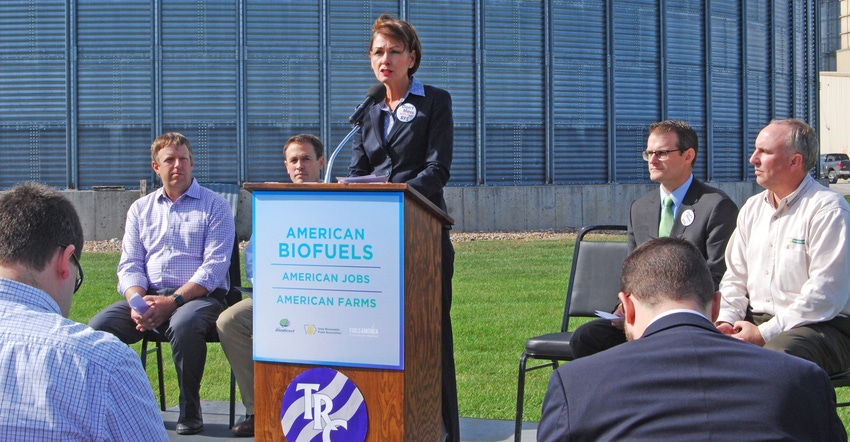October 30, 2017

On the campaign trail in 2016, presidential candidate Donald Trump came to Iowa and promised: “We’re going to protect the Renewable Fuel Standard. The RFS is an important tool in the mission to achieve energy independence for the United States. I will do all that is in my power as president to achieve that goal.”
That quote is often repeated these days by farmers, by Iowa’s top political leaders and by other biofuel supporters. They question recent proposals by the U.S. Environmental Protection Agency to roll back the RFS, a federal law requiring a certain amount of ethanol and biodiesel to be blended in the nation’s motor fuel supply each year.
Iowa Gov. Kim Reynolds and Iowa’s two U.S. senators of Iowa — Chuck Grassley and Joni Ernst — have been told by Trump that he will support the RFS. But the governor, the senators and others say they’re not letting up on holding the Trump administration to his promise.
“I felt very good after my conversation with the president and EPA Administrator Scott Pruitt, but that doesn’t mean we stop,” Reynolds told a recent press conference at Two Rivers Cooperative in Pella. “It’s not done until it’s done. We need to bring certainty and stability back to the biofuels market.”
EPA to make biofuel volume decision soon
The Trump administration is to make a decision soon on whether to increase the RFS volume requirements for 2018 for ethanol and 2019 for biodiesel. EPA decides this and is supposed to announce the Renewable Volume Obligations (RVOs) by Nov. 30.
Iowa leads the nation in ethanol and biodiesel production. Monte Shaw, who heads the Iowa Renewable Fuels Association, says Iowa has added about 600 million gallons of capacity the last two years at biodiesel, ethanol and cellulosic ethanol facilities. If all plants operate at capacity, an IRFA-funded study indicates an additional 11,000 jobs will be created directly and indirectly, a 25% increase. It would boost Iowa income by over $500 million, up 24%.
“We’re talking about a state that has seen farm income decline for three years in a row. This expansion is a potential economic boost the ag economy and the state as a whole could use,” says Shaw. “The key is we need these plants up and operating at capacity, and having a robust RFS is the key to achieving that.” To view the study online.
Farmers support a strong RFS
Dennis Bogaards began farming in 1992, as the farm economy was just recovering from the mid-1980s financial crisis. It recovered, thanks in part to opportunities created by establishing the renewable fuels industry. “In my 27 years of farming, I’ve experienced the economic ups and downs of my profession,” he says. “I’ve also become very aware of the important role biodiesel and ethanol play in Midwest agriculture.”
Farming with his family near Pella, Bogaards remembers when excess supplies of soy oil and corn saturated the market, bogging down soybean and corn prices. The ethanol and biodiesel markets were eventually established to convert excess supplies of soy oil, corn oil, animal fat and cornstarch into renewable fuel. Suddenly those commodities gained value, helping boost the overall value and price of corn and beans, and provide additional protein feed sources for livestock.
“Biofuels also offer a clean-burning fuel to power America, reducing dependence on imports of foreign oil,” he adds. “We use biodiesel in our farm tractors, combines and semitrucks, and ethanol in all of our gas-powered vehicles. Like other farmers, I’m an investor in an ethanol plant. The RFS is very important to me and all farmers.”
Farmers can supply corn, beans
Despite one of the worst droughts in all his years farming, Bogaards this fall is harvesting one of his largest crops ever. USDA estimates Iowa’s soybean crop at 550 million bushels, second largest in state history. Iowa’s 2017 corn crop at 2.46 billion bushels is third largest ever.
“At this time of low commodity prices and large inventories of grain, reducing the Renewable Fuel Standard and gutting the ethanol and biodiesel industries, which are built around the RFS, would be devastating to farmers and rural communities,” says Bogaards. “I urge EPA Administrator Scott Pruitt and President Trump to not only retain the RFS but look for opportunities to expand it.”
Biodiesel and ethanol are extremely important not only to farm families but to the state’s economy, notes Grant Kimberley, Iowa Biodiesel Board executive director and director of market development for the Iowa Soybean Association. He farms with his family in central Iowa.
RFS creates opportunities in rural areas
Iowa has 12 biodiesel plants and capacity to produce over 400 million gallons annually. But that capacity remains underutilized. Nationally, biodiesel supports over 64,000 jobs, and there are biodiesel plants in just about every state. “The RFS is bigger than just a Midwest or Iowa issue,” says Kimberley. “The RFS creates positive financial results for rural America. It creates income in areas of the country where it is often challenging to find jobs.”
Gutting the RFS would worsen the struggles farmers are already facing today and could push agriculture into a recession, he warns. “We have commodity prices 50% to 60% lower than five years ago. Reducing the RFS would only make our low prices worse. It would be reminiscent of pushing agriculture back closer to what we experienced in the 1980s farm depression.”
According to the RFS, “we think there should be an increase in biodiesel volumes, not a decrease,” says Kimberley. “We urge the president not to buckle to the interests of petroleum companies and refiners. But rather, stay true to promises made on the campaign trail, to benefit Iowans and all Americans. The RFS is about American jobs and energy, national security and certainly it’s about rural America.”
You May Also Like




